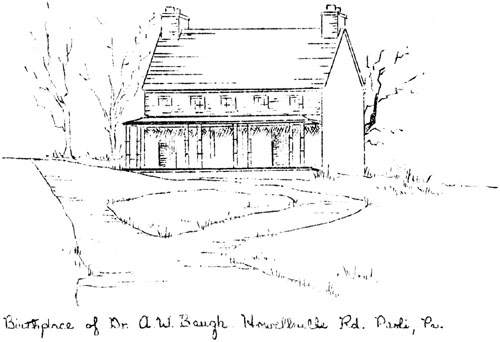|
Home : Quarterly Archives : Volume 6 |
Tredyffrin Easttown Historical Society |
|
Source: 1945 Volume 6 Number 2, Pages 35–36 Anthony Wayne Baugh, M.D. The Baugh (originally Boch) family of German Mennonites from the upper reaches of the Neckar River, near Stuttgart, Wurtemberg, fleeing from religious persecution, arrived in Philadelphia in September, 1728, in the ship "Winter Galley". About April 12, 1743, a son settled on a tract of 211 acres in the Great Valley, extending along the Bear Road from immediately west of Howell's tavern (now Howellville) to Paoli. During the encampment of the British army in the vicinity, September 18th- 21st, 1777, Jacob Baugh suffered severely from the loss of crops and the wanton damage to his property. There is a tradition of how the enraged housewife emptied a skillet of hot grease, in which she had been frying doughnuts, on the head of a Hessian soldier who had booted her boy into the kitchen and how he and his fellows in retaliation, broke all the window-glass and ripped up the beds, scattering the goose-feathers to the four winds. Two Hessian deserters were shot and buried on the farm. A descendant at an early date began experiments in phosphates to enrich the soil, resulting at first in a small plant in Downingtown, and later in the development of the widely known plant on the Delaware River. The name of Baugh is known wherever soil conservation is practiced. Dr. A. Wayne Baugh (whose given name does not come direct from that famous general, but from an uncle in the family), was fifth in the line of the American branch; born at the homestead in Tredyffrin, May 6, 1867; he died at Paoli, November 8, 1938. He received his early education in the Howellville public school, and later attended James T. Doran's private school in Berwyn. He graduated from the Medical College of the University of Pennsylvania in 1892, and served two years as intern in St. Joseph's Hospital, Reading. A fellow classmate, during his freshman year, remarked that Baugh was by far the most promising student in his class, and whenever a difficult problem appeared, the whole class became eager to learn "what Baugh thought of it". His practice began at the old Homestead, but he later purchased the property on the southeastern corner of the Lancaster Pike and Darby Road, Paoli. He married Mary Elizabeth, daughter of Joseph and Jane Williams of Berwyn, and they had one daughter, Marion Edith (now Mrs. Raymond M. Trice), Dr. Baugh was on the Pension Board for about twenty years; Pennsylvania Railroad Surgeon, School Director and Secretary for two terms; Medical Director for several townships; Sergeant-at-Arms in the Republican National Convention, and School Physician in Tredyffrin, a position he held up to the time of his death. He was a member of the Chester County and the American Medical Associations; the Pennsylvania Museum and Alumni; Thompson Lodge No. 340, Free and Accepted Masons; the Chester County Historical Society, and the Tredyffrin-Easttown History Club - the last he helped to organize. His brother, James, owned the A. B. Coxe-bred "Peter Harvester", first horse to finish a quarter mile in 29 seconds, but the Doctor in his leisure moments was most concerned with historical matters. Gifted with a retentive memory, a great love for his native land, and a keen sense of humor, one of the anecdotes he was fond of repeating while riding through the rural districts of Chester County I shall endeavor to give verbatim: "A local farmer and his boy, while engaged in clearing the fence corners close to the highway, were accosted by a party in an automobile who had lost their way. After imparting the desired information the boy ventured to inquire from whence they came. The farmer reproved his boy. 'Son', he said, 'you hadn't ought to have asked them where they came from. If they came from any part of Chester County they would have told you so before they left, and if they came from the outside they, not we, should worry!" Dr. Baugh contributed a variant of Washington Irving's "Legend of Sleepy Hollow", a weird myth which was later featured by several urban newspapers and by a radio commentator. Briefly it was the tale of a phantom trooper mounted upon a white steed, who pathetically offered his severed head to chance wayfarers, as he rode along the Darby Road in Paoli. The time was midnight and on the anniversary of the Paoli massacre. As a traveller, Dr. Baugh was most happy seated in the automobile beside the late Professor Teamer, road-map in hand. As a historian and philosopher, he delighted in the location of Thoreau's bean-patch at Waldon Pond, in the contemplation of the memorial to Pocahontas at Jamestown, or a sunset over the great plains. As a family physician, he perhaps contributed more than his share to charity, in which he exemplified the true spirit: service to humanity first, financial consideration last. It may be truly said of him that he followed the injunction, "Inasmuch as ye have done it unto the least of these my brethren, ye have done it unto me".
Birthplace of Dr. A.W. Baugh, Howelville Rd., Paoli, PA |
